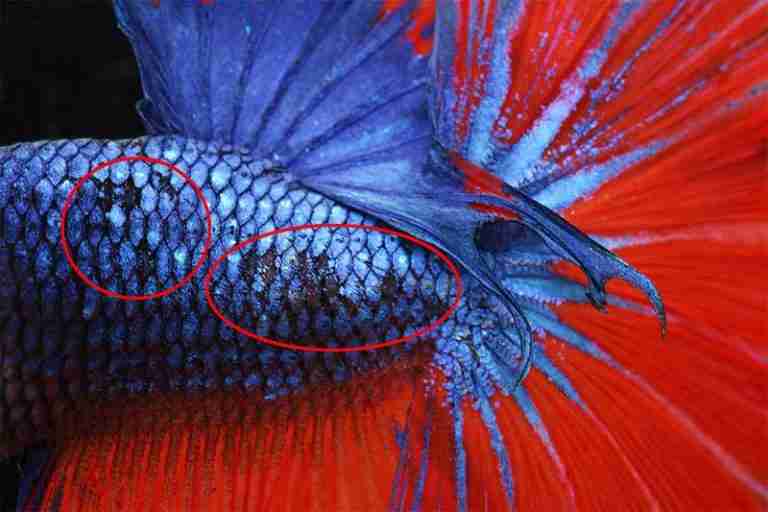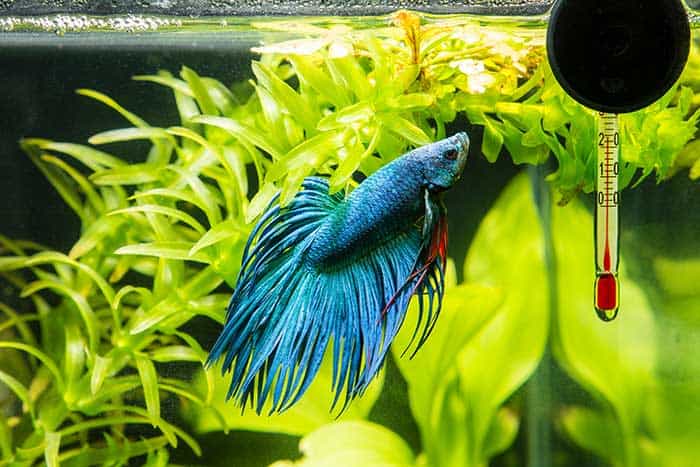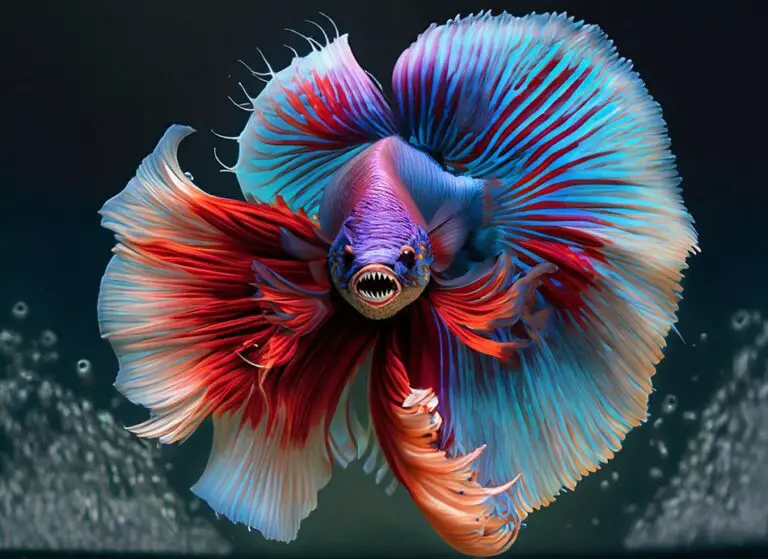Why Do Betta Fish Fight (and how to stop aggressive behavior)
Betta fish are called Siamese Fighting Fish for a reason, and If you’ve ever kept more than one male betta fish in a tank, chances are you’ve witnessed them fighting. But why do betta fish fight? Let’s take a closer look at the reasons behind this aggressive behavior and how to deal with it.
The most common reasons why betta fish fight are:
- Territorial aggression – Male betta fish are known for being highly territorial. They will often fight other males entering their territory to protect their space.
- Mating season – A betta’s territorial instinct is even stronger when it comes to breeding season. During this time, males will become extremely aggressive to defend their nests and mate with as many females as possible.
- Poor water conditions – Betta fish are susceptible to environmental changes, and if the water quality is poor, they may become aggressive due to stress.
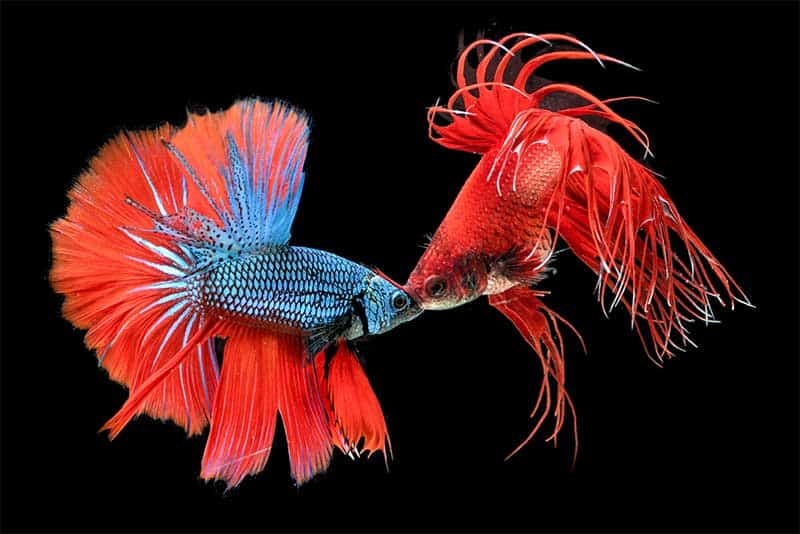
If you are planning on keeping betta fish together or in a community tank with other fish, you need to understand why their aggressive behavior. This article answers the question, “Why do betta fish fight?” while looking at the main causes of betta aggression and what you can do to reduce the risk of fighting.
I also recommend reading my article: 9 Common Reasons For Angry Betta Fish.
Do Betta Fish Fight To The Death?
Male betta fish can be very aggressive, and you’ve probably heard that two males will fight to the death. Although death rarely happens from the fight itself, injuries can be severe and cause life-threatening infections. In the wild, bettas rarely live longer than a year due to fighting.
The cause of aggression in betta fish can be traced back to their native habitat in Southeast Asia. In the wild, bettas live in murky waters with very little vegetation. As a result, they have evolved to be highly territorial to protect their food sources and mating grounds.
When two males encounter each other, they will flare their fins to intimidate each other with displays of strength and aggression. If this doesn’t work, they will often fight to the death or until one betta retreats.
In captivity, bettas still exhibit aggressive behavior, so it’s wise only to keep one male betta fish in a tank. If you want to keep your betta in a community tank, there are several things you can do to help reduce aggression levels.
- Make sure the tank is large enough to provide some territory for your betta.
- Provide plenty of hiding places using plants and ornaments to create visual barriers.
- Keep your betta well-fed, as a hungry betta fish is more likely to be aggressive in search of food.
- Choose compatible tank mates less likely to pick a fight or invade your betta’s space.
Betta fish can make excellent community fish in the right environment and if their tank mates are peaceful non-intrusive species.
Many people ask the question, do betta fish get lonely or bored when in a tank by themselves? The truth is, betta fish commonly live solitary lives in their natural habitat and can be quite content in a tank by themselves. Betta fish need some form of stimulation from time to time and a comfortable environment.
How Do Betta Fish Fight?
Bettas use their long fins to show dominance over their territory. The bigger and brighter a betta’s fins are, the more likely he is to win a fight. When two bettas encounter each other, they flare their fins and swim toward each other to intimidate the other fish. If that doesn’t work, the next step is physical violence.
Bettas will bite each other’s fins or chase each other around until one fish decides he has had enough and leaves the battle. Betta fish have small teeth that can be used to hold a betta while fighting, causing tears to the fins, tail, and delicate tissue around the gills.
If you notice your betta losing scales from fighting, this can lead to infections such as body rot or fungal infections setting in. Torn and damaged fins can lead to fin rot which is a bacterial infection that can cause fins to literally disintegrate if left untreated.

If you want to learn more about fin rot, you can read my article: Betta fish fin rot – Symptoms and treatments.
A male betta fish fight can be fierce and quite something to watch. Still, I don’t recommend that you deliberately cause a fight just for your curiosity or entertainment, as it is extremely cruel to these intelligent fish.
Betta fish fighting has been a gambling activity in many parts of Asia for hundreds of years but is far less common today. Betta fish were selectively bred for their aggression, aiming to increase aggression by selecting the characteristics that make good fighters.
Selective breeding is still carried out with betta fish, but it is now specifically to isolate specific color variants.
How Long Does A Betta Fish Fight Last?
Betta fish fights can last anywhere from a few seconds to several minutes. Most disputes are brief and end with one fish chasing the other away. The length of the fight will depend on the reason for the fight, the health of the betta fish, and the temperaments of the fish involved.
Male bettas will often fight each other to gain access to a female. The female will usually choose the fight’s victor, and breeding will occur.
Betta fish fighting can also be a form of play. Some bettas will engage in mock battles with each other to have some fun. This is usually not a serious type of fighting and usually doesn’t result in injuries.
The severity of the fighting will also depend on the personality of the two fish involved. Some bettas are more aggressive than others and will participate in longer, more intense fights. Most bettas are relatively peaceful and only engage in short bouts of fighting.
You will often find a betta fish hiding rather than looking for a fight, but when threatened, they won’t usually back down without a display of aggression.
How To Stop Betta Fish From Fighting
If you want to stop your betta fish from fighting, you must identify the cause. Providing plenty of tank space, hiding spots, and a good diet is usually enough to stop aggressive behavior. If you have a cranky betta fish with a bad attitude, it should be kept in a tank by itself.
So how big should a betta fish tank be? A betta tank should be at least 20 gallons if you are keeping other fish in the tank. The larger the tank, the less likely they will fight. Hiding spots are important as betta fish don’t usually go looking for a fight and often prefer to retreat to a safe place.
A persistent fish will probably trigger an aggressive response from a betta fish defending its territory. There will be several warnings of fin or gill flaring and aggressive chasing before a betta fish attacks.
All fish fight to some degree, it’s in their nature, but bettas are known to be exceptionally aggressive and territorial fish, so it’s wise to take precautions.
Do Female Betta Fish Fight Each Other?
Female betta fish are not as aggressive as their male counterparts but may fight when defending their territory or over a potential mate. When female bettas are kept in the same tank, they will often establish a hierarchy, with one fish taking on the role of the dominant female.
Because female bettas are much less aggressive, many breeders will create a betta sorority tank. A betta sorority tank is usually made up of 4-6 female bettas that are very useful for breeding.
Breeding betta fish can take up a lot of space, with each fish needing a separate tank, but if you can make a sorority tank work, it is much more cost-effective, and you can transfer females into a male bettas tank when they are ready to mate.
You will know when a male betta is ready to mate as it will build a bubble nest at the top of its tank. The bubble nest will be used to store the female betta’s eggs once the male has fertilized them. Once mating is over, the female can be placed back into the sorority tank.
Because female betta fish have the potential to fight each other, you should also provide plenty of space and hiding places when setting up your sorority tank. Heavily planted sorority tanks are most successful as the females can feel safe and are likelier to be sociable.
Another helpful tip for setting up a successful sorority tank is introducing fish from a young age before reaching sexual maturity. Although this is not necessary, it does give the females a chance to get comfortable with each other before they become territorial.
Do Male And Female Betta Fish Fight Each Other?
Male and female betta fish will fight each other in normal circumstances. The male’s aggression over territory is not only toward males but also extends toward female betta fish. The exception is when the male betta is ready to mate, where he will try to encourage the female into his territory.
Not all male and female betta fish will fight, and this entire article is based on my own experiences and the experiences of many other betta owners. The simple truth is that many fish keepers successfully keep male and female betta fish in the same tank.
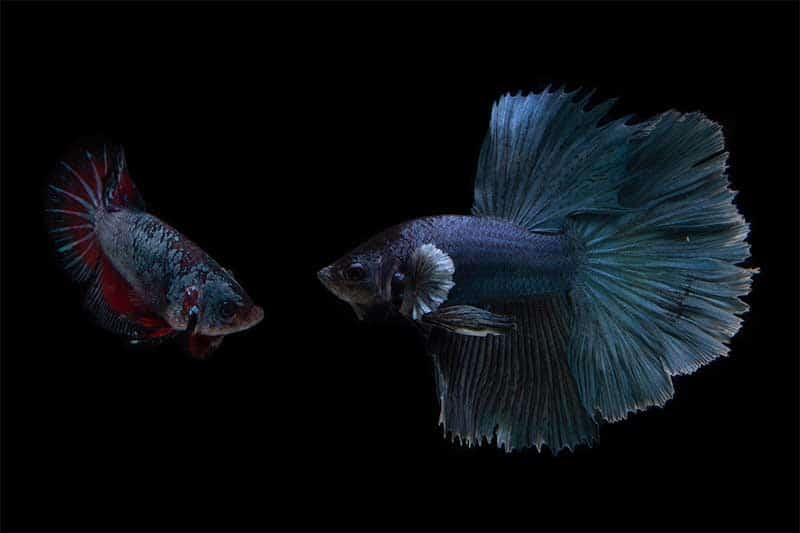
Not all betta fish are the same, and like people, they have individual characters or personalities. Some betta fish are calm and laid back, whereas others are angry and aggressive.
If you want to try to keep a male and female betta fish in the same tank, follow my previous advice and provide space and plenty of plants or caves to hide. You may find they will live happily at either end of the tank or may become best friends.
For more in-depth information, you should read: Can Male And Female Betta Fish Live Together?
Are Betta Fish Aggressive Toward Humans?
Betta fish are not aggressive toward humans. If your betta fish flares at you, it is probably happy to see you, it is expecting to be fed, or it just wants to play. Fin and gill flaring is not just a sign of aggression, so getting to know your betta fish’s body language is essential.
Betta fish can be incredibly social, and they enjoy stimulation. Many betta owners have even trained their betta fish to swim through hoops or recognize different colors. The truth is, a happy betta fish will love contact with its human owner.
Do All Betta Fish Fight Each Other?
Not all betta fish will fight each other. Fighting is often triggered by the environment, causing a stress response. It is always hard to tell if two betta fish will fight, but if placed in a non-stressful environment, they may live peacefully.
Fighting among betta fish is common, but fighting to the death is unlikely unless you place them into a small bowl with nowhere to run and hide.
Many aquarists believe bettas fight when they are kept in poor conditions, such as small tanks with no hiding places. When kept in a large tank with plenty of space and hiding places, bettas will usually coexist peacefully.
I wouldn’t recommend that you try to keep more than one betta in the same tank unless you have plenty of experience with them, but I have witnessed people keeping 4 or 5 male betta fish in a fish tank, and they swim happily together.
Wrap Up
Betta fish are very temperamental, and with the name “Siamese Fighting Fish,” they have rightly earned a reputation for being aggressive toward each other.
While it’s true that bettas are incredibly territorial and can often be aggressive due to poor living conditions or overcrowding, not all betta fish will fight each other. With some experience, proper care, and a little patience, it is possible to keep multiple bettas in the same tank without worrying about them continually fighting.




